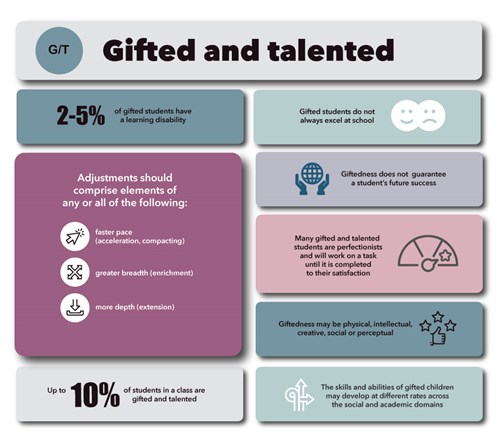
Gifted and talented students benefit from rigorous, relevant and engaging learning opportunities based on the Australian Curriculum content. ACARA acknowledges that numerous models of curriculum adjustment for gifted and talented students are available; specific models may be referenced in jurisdictional resources.
Gifted and talented students:

There is no universally accepted definition of students identified as gifted and talented. A common understanding is that giftedness and talent in students result in their displaying a selection of characteristics at home and school that are significantly above the average for their age.
It is difficult to estimate the total number of gifted and/or talented students in Australian schools. Estimations are dependent on the methods and models used to identify gifted and/or talented students; however, many consider ten per cent to be a reasonable guide.
The following points should be considered in developing personalised learning plans for gifted and talented students:
[*] Wormald, C. (2015, March 25). Intellectually gifted students often have learning disabilities. The Conversation. Retrieved from.: https://theconversation.com/intellectually-gifted-students-often-have-learning-disabilities-37276
The Melbourne Declaration (2008) espouses the dual goals of equity and excellence. Excellence requires all students to have access to a curriculum that encourages high expectations of all learners .
Each state and territory has processes in place to identify gifted and talented learners and to meet the goals of the Melbourne Declaration. Schools can also use the three dimensions of the Australian Curriculum to develop effective gifted and talented programs.
Over the past two decades state and federal education authorities have contributed to inquiries into the education of gifted and talented children. The submissions have addressed a range of issues, including: